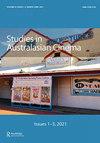Changing accents: Place, voice and Top of the Lake
IF 0.7
0 FILM, RADIO, TELEVISION
引用次数: 4
Abstract
ABSTRACT This article examines the role that locality, cultural specificity and authentic voice play within current television industry shifts and transnational developments. Focussing on Top of the Lake, I explore its thematic and aesthetic preoccupation with place, voice and nation by spotlighting issues of accent and vocal in/authenticity, detailing the controversy sparked when US star Elisabeth Moss was cast as New Zealand native, detective Robin Griffin. The adopted Antipodean accent furnished by Moss creates a highly ambivalent foregrounding and re-negotiation of the national within the particularly transnational space of post-broadcast ‘quality’ television. Presenting a ‘sonic spectacle’ (Holliday, Christopher. 2015. “The Accented American: The New Voices of British Stardom on US Television.” Journal of British Cinema and Television 12 (1): 63–82), Moss’ wobbly accent makes audiences doubly aware of the effort being expended to cue regional specificity and locale. In the following discussion, Moss’ vocal crafting in Top of the Lake is linked to the increasing importance given to authentic place and on-location shooting within post-broadcast television, as a means of fostering emotional pull and deep levels of viewer engagement. In Top of the Lake, links between place and authenticity are further interrogated via its self-aware invocation of touristic imagery and desires – made all the more nuanced due to Campion's presence as auteur and New Zealand's role as media-tourism mecca.改变口音:地点,声音和湖之巅
摘要本文探讨了地域、文化特殊性和真实声音在当前电视产业转型和跨国发展中的作用。在《湖之巅》中,我通过突出口音和声音的真实性问题,探讨了它对地方、声音和国家的主题和美学关注,详细描述了美国明星伊丽莎白·莫斯(Elisabeth Moss)饰演新西兰本土侦探罗宾·格里芬(Robin Griffin)所引发的争议。莫斯所采用的澳大利亚口音创造了一种高度矛盾的前景,并在广播后“高质量”电视的跨国空间中重新谈判国家。呈现“声音奇观”(Christopher Holliday, 2015)。“有口音的美国人:美国电视上英国明星的新声音”《英国电影电视杂志》12(1):63-82),莫斯不稳定的口音让观众加倍意识到他为暗示地域特殊性和地点所做的努力。在接下来的讨论中,Moss在《Top of the Lake》中的声音制作与后广播电视中对真实地点和现场拍摄的日益重视有关,这是一种培养情感吸引力和深度观众参与的手段。在《湖之巅》中,通过对旅游意象和欲望的自觉召唤,进一步审视了地点和真实性之间的联系——由于坎皮恩作为导演的存在和新西兰作为媒体旅游圣地的角色,这一切都变得更加微妙。
本文章由计算机程序翻译,如有差异,请以英文原文为准。
求助全文
约1分钟内获得全文
求助全文

 求助内容:
求助内容: 应助结果提醒方式:
应助结果提醒方式:


